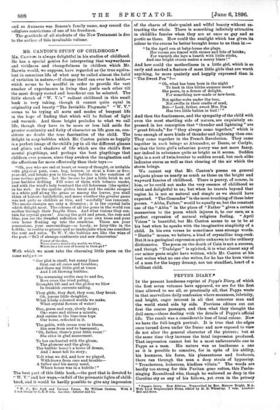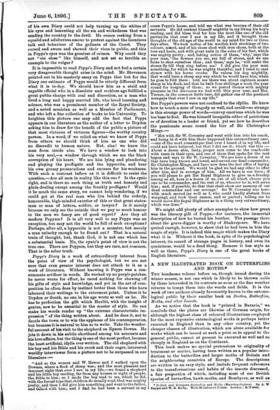PEPYS'S DIARY.*
IN the present handsome reprint of Pepys's Diary, of which the first seven volumes have appeared, we are for the first time allowed to see all, or practically all, that Pepys wrote in that marvellous daily confession where meanness, lubricity, and bright, eager interest in all that concerns man and the world stand side by side. Previous editors cut out first the coarse passages, and then what they thought the dull ones,—those dealing with the details of Pepys's official life. The result was a considerable loss of local colour. Now we have the full-length portrait. It is true that the edges once turned down under the frame and now exposed to view do not alter the general character of the picture ; but at the same time they increase the total impression produced. That impression cannot but be a moat unfavourable one to Pepys as a man. His nature was as loathsome a one as it is possible to conceive, for in spite of his ability, his keenness, his force, his pleasantness and bonhomie, there ran through the man a deep strain of hypocrisy. " Treacherous, lecherous, kindless villain." The words are hardly too strong for this Puritan gone rotten, this Psalm- singing Roundhead who, though he wallowed as deep in the Caroline sty as any of his fellows, yet even in the privacy • Porne's Diary. New Edition. Transcribed by Bey. Mynors Bright, M.A. With Lord Braybrooke's Notes, edited by if. B. Wheatley. 7 vols. London: Bell and Bona.
of his own Diary could not help turning up the whites of his eyes and lamenting all the sin and wickedness that was sending the country to the deviL He comes reeking from a squalid and adulterous amour to protest against the licentious talk and behaviour of the gallants of the Court. They cursed and swore and showed their vices in public, and this in Pepys's eyes was the greatest of crimes. Why could they not "sin close" like himself, and not set so terrible an example to the vulgar P
It is impossible to read Pepys's Diary and not feel a certain very disagreeable thought arise in the mind. Mr. Stevenson pointed out in his masterly essay on Pepys that but for the
Diary our estimate of Pepys would be utterly different from
what it is to-day. We should know him as a staid and capable official who in a dissolute and reckless age fulfilled a great public charge with zeal and discretion, as a man who
lived a long and happy married life, who loved learning and science, who was a prominent member of the Royal Society, and a noted musician as well as a Member of Parliament, and who left a fine collection of books to his University. To heighten this picture one may add the fact that Pepys appears in our literature as the author of a letter to Dryden asking him to draw for the benefit of the public a picture of that most virtuous of virtuous figures—the worthy country parson. In a word, if we relied on what we know of Pepys from others we should think of him as one who did no discredit to human nature. But, alas ! we know the man from inside also. We have a window to look into his very sonl,—a window through which we see the black corruption of his heart. We see him lying and plundering and playing the profligate and the hypocrite, and hear his own greasy protestations and excuses for his weakness. With such a contrast before us it is difficult to resist the question,—Are all men in reality like this one P Ia the cynic right, and is there no such thing as truth and honesty and plain-dealing except among the frankly profligate P Would it be much the same story, we cannot help wondering, if we could get at the real man who lies behind the orderly, honourable, high-minded exterior of this or that great states- man or man of letters, soldier, or lawyer P Is it merely because we only see the outside that we pay so much honour to the men we fancy are of good report P Are they all modern Pepyses P It is all very well to say Pepys was an exception, but may not the world be full of such exceptions P Perhaps, after all, a hypocrite is not a monster, but merely a man unlucky enough to be found out P That is a natural train of thought, but, thank God, it is not one which has a substantial basis. No, the cynic's point of view is not the true one. There are Pepyses, but they are rare, not common. That is the sober truth.
Pepys's Diary is a work of extraordinary interest from the point of view of the psychologist, but we are not sure that even greater interest does not attach to it as a work of literature. Without knowing it Pepys was a con- summate artificer in words. He worked up no purple patches, he never wrote for effect, he cared nothing for showing off his gifts of style and knowledge, and yet in the art of com-
position he often does by instinct better than those who have laboured their writings to the extremest point. Unless it be Dryden or South, no one in his age wrote so well as he. He has to perfection the gift which Hazlitt, with the insight of genius, saw to be essential to the master of style. He can make his words render up "the extreme characteristic im- pression" of the thing written about. And he does it, not to dazzle the town or to win the applause of his contemporaries, but because it is natural to him so to write. Take the wonder- ful account of his visit to the shepherd on Epsom Downs. He jots it down in his subtle shorthand among his accounts and his love affairs, but the thing is one of the most perfect, because
the least artificial, idylls ever written. The old shepherd with his boy and his Bible and his crook and their eager, interested worldly interviewer form a picture not to be surpassed in our
literature :—
"And so the women and W. Hewes and I walked upon the Downes, where a flock of sheep was; and the most pleasant and innocent sight that ever I saw in my life,—we found a shepherd and his little boy reading, far from any houses or sight of people, the Bible to him; so I made the boy read to me, which he did, with the forced tone that children do usually read, that was mighty pretty, and then I did give him something, and went to the father, and talked with him; and I find he had been a servant in my cozen Pepys's house, and told me what was become of their old servants. He did content himself mightily in my liking his boy's reading, and did bless God for him the most like one of the old patriarchs that ever I saw in my life, and it brought those thoughts of the old age of the world in my mind for two or three days after. We took notice of his woollen knit stockings of two colours, mixed, and of his shoes shod with iron shoes, both at the toes and heels, and with great nails in the soles of his feet, which was mighty pretty ; and, taking notice of them, why,' says the poor man, the downer you see, are full of stones, and we are faille to shoe ourselves thus ; and these,' says he, will make the stones fly till they sing before me' I did give the poor man something, for which he was mighty thankful, and I tried to cast stones with his home crooks. He values his dog mightily, that would turn a sheep any way which he would have him, when he goes to fold them : told me there was about eighteen sooare sheep in his flock, and that he hath four shillings a week the year round for keeping of them ; so we posted thence with mighty pleasure in the discourse we had with this poor man, and Mrs. Turner, in the common fields here, did gather one of the prettiest nosegays that ever I saw in my life."
But Pepys's powers were not confined to the idyllic. He knew how to touch a note of tragedy as well, and could—so strange is this strange power of words—convey emotions which he was too base to feeL He was himself incapable either of patriotism or of devotion to a leader or friend, yet see how he describes the passionate scene round the bier of Sir Christopher Mings
"Met with Sir W. Coventry and went with him into his coach, and being in it with him there happened this extraordinary case, —one of the most romantique that ever I heard of in my life, and could not have believed, but that I did see it ; which was this :- About a dozen able, lusty, proper men come to the coach-side with tears in their eyes, and one of them that spoke for the rest begun and says to Sir W. Coventry, We are here a dozen of us that have long known and loved, and served our dead commander, Sir Christopher Mings, and have now done the last office of laying him in the ground. We would be glad we had any other to offer after him, and in revenge of him. All we have is our lives ; if you will please to get His Royal Highness to give us a fireship among us all, here is a dozen of us, out of all which choose you one to be commander, and the rest of us, whoever he is, will serve him ; and, if possible, do that that shalt show our memory of our dead commander and our revenge.' Sir W. Coventry was here- with much moved (as well as I, who could hardly abstain from weeping), and took their names, and so parted ; telling me be would move His Royal Highness as in a thing very extraordinary, which was done."
We might add plenty of other examples to show how great was the literary gift of Pepys,—for instance, the immortal description of how he buried his brother. The passage there about the grave-digger is worthy of Shakespeare. We have quoted enough, however, to show that he had born in him the magic of style. It is indeed this magic which makes the Diary what it is. Without it the book, in spite of its psychological interest, its record of strange pages in history, and even its quaintness, would be a dead thing. Because it has style as well as these, Pepys's Diary is one of the great books of English literature.







































 Previous page
Previous page